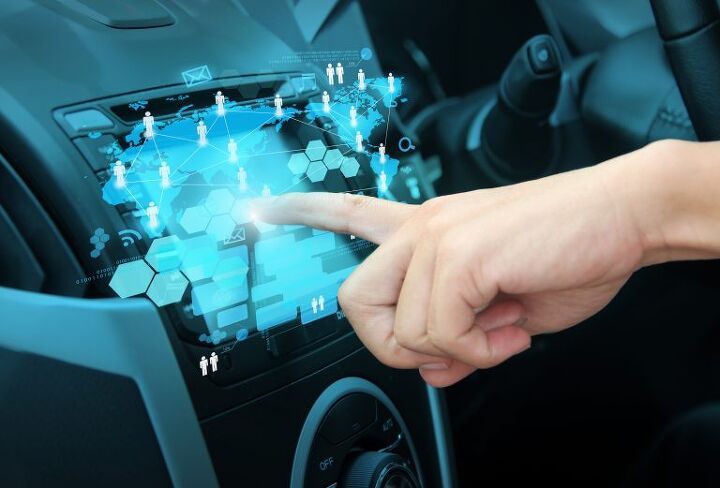#GoogleMaps
Going Android: Ford and Google Enter Six-year Data Partnership
On Monday, Ford and Google jointly announced a strategic, six-year partnership to accelerate the automaker’s connected vehicle and data service programs. Framed as part of Ford’s natural evolution into an information focused mobility firm, the release was loaded with corporate buzz phrases that we had to clean up. But the gist is that Ford would like to leverage Google Cloud for its products, meaning all future Ford models will be running Android operating systems starting in 2023.
This clears a pathway for improved integration from Google Assistant, Maps, Play, or any third-party applications catering to the incredibly popular OS. Unfortunately, it also highlights how gaga automakers are getting about data for the umpteenth time.
Google Maps Finally Tracking Speed Limits, Speed Traps
The next time you use Google Maps to plan a road trip, you might notice some changes. Maps is now providing live updates on posted speed limits across the United States. Previously, this feature was only available in San Francisco. However, other parts of the country started seeing the feature crop up late last week as Google updated local servers.
This author saw changes on the app as early as January 18th. Travelling a bit too far from major metropolitan hubs or major highways has proven coverage has not yet gone nationwide. Google says it hopes to soon remedy that by implementing the service across the United States, United Kingdom, and select parts of mainland Europe. Of course, if you don’t want to wait, Waze (also owned by Google) has had this feature available for years, and remains the more robust navigation platform.
Volkswagen GTI-Themed Waze App Steers You Toward a Good Time
Our personal biases frequently lead us to condemn any number of advanced automotive technologies. That’s partly because we’re dinosaurs who fetishize vintage automobiles that, in reality, are actually far worse than we like to pretend. But it’s also because most modern-day tech sucks harder than a jet-powered Dyson. A large portion of that problem stems from automakers implementing technology solely to appease regulators or line their pockets with cash.
Fortunately, this isn’t always the case. You sometimes end up with things like power windows, torque vectoring, the dual clutch transmission, and satellite navigation. And while it’s still handy to know how to read a map, GPS has made car-based voyages a breeze, and it’s only getting better.
Waze, a preferred navigation app for many, offers community-confirmed accident information, fuel pricing, and speed traps. Since its purchase by Google in 2013, the system now finds itself baked into Android Auto. Things are progressing rather nicely, as a new partnership with Volkswagen implements features that cater specifically to driving enthusiasts.
Apple Rebuilding Maps App, Hopes to Outperform Google
Apple Maps has been a lackluster tool for navigation since its launch. Of course, you probably don’t know this because you’re statistically more likely to back out of the driveway using Google Maps or Waze. That’s because the latter programs seem to work as intended. The same cannot be said of the former.
While Apple can get you down a major highway without incident, it frequently falls apart when you start asking it to make sense of a complex, overlapping network of roads or sparsely traveled rural area. Meanwhile, Google has already mapped the same areas twice and taken photos of every blade of grass within 100 square miles.
Upon launch, Apple Maps was plagued with issues. Areas were left blank, locations were misnamed, landmarks were misplaced. Had it come out a decade earlier, it’d have been a technological marvel. But with competent competition readily available, the iOS-based navigation system was (and remains) unacceptable. So Apple is giving it a complete overhaul.
Study: Using Satellite Navigation Shuts Down Parts of Your Brain
A new study suggests drivers who follow GPS directions regularly do not engage their hippocampus, highly limiting the development of an internal map and making them more dependent on navigation devices. We’ve all heard accounts of London cabbies with juicy, swollen central lobes, stemming from the requisite training and memorization of city streets and landmarks. It turns out the inverse may also be true. This may be another classic case of if you don’t use it, you lose it.
The University College London discovered the hippocampus (used for direction and memory) and the prefrontal cortex (used for decision-making) both saw elevated levels of activity whenever drivers turned down unfamiliar streets or had free-choice to follow along their route. However, those making use of navigational systems produced no additional activity in those areas whatsoever. Zero, zilch, nada.
Vellum Venom Vignette: Less Is More With In Car Entertainment
I’ve been accused of Automotive Hipsterism for bragging about my bare bones Ford truck instead of aspiring to expensive vehicles. It used to be different, back when top-drawer dashboards were more Malevich and less Pollock in design. Because good design embraces Less is More, while poor design over thinks the solution.





















Recent Comments